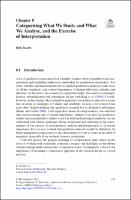Chapter 8 Categorising What We Study and What We Analyse, and the Exercise of Interpretation
| dc.contributor.author | Jacobs, Dirk | |
| dc.date.accessioned | 2018-07-01 23:55 | |
| dc.date.accessioned | 2020-03-18 13:36:15 | |
| dc.date.accessioned | 2020-04-01T12:37:19Z | |
| dc.date.available | 2020-04-01T12:37:19Z | |
| dc.date.issued | 2018 | |
| dc.identifier | 1000195 | |
| dc.identifier | OCN: 1051780114 | en_US |
| dc.identifier.uri | http://library.oapen.org/handle/20.500.12657/29753 | |
| dc.description.abstract | A lot of qualitative researchers have a healthy wariness about straightforward categorisation and modelling endeavours undertaken by quantitative researchers. Too often, variables and measurements are too rigid in quantitative analysis to take stock of all the complexity and context-dependency of human behaviour, attitudes and identities. In the worst-case scenario for migration studies, this leads to oversimplification, essentialisation and culturalism. In line with King et al. (1994), I would, however, in this chapter, like to plead for qualitative researchers to take into account that, in terms of challenges of validity and reliability, we have a lot to learn from each other. Acknowledging that qualitative research has its distinctive advantages (Brady and Collier 2004), I will argue that choices in categorisation, case selection and research design are of crucial importance, perhaps even more in qualitative studies than in quantitative studies, even if in both methodological traditions we are confronted with similar challenges. Being transparent and reflecting on the consequences of our choices of categorisation, analysis and interpretation is of crucial importance. It is too easy to think that qualitative research would, by definition, be better equipped in doing justice to the phenomena we wish to study in the field of migration, especially if our research focusses on migrants. | |
| dc.language | English | |
| dc.subject.classification | thema EDItEUR::J Society and Social Sciences::JB Society and culture: general::JBF Social and ethical issues::JBFH Migration, immigration and emigration | en_US |
| dc.subject.classification | thema EDItEUR::5 Interest qualifiers::5P Relating to specific groups and cultures or social and cultural interests::5PB Relating to peoples: ethnic groups, indigenous peoples, cultures and other groupings of people::5PBC Relating to migrant groups / diaspora communities or peoples | en_US |
| dc.subject.other | Categorisation | |
| dc.subject.other | Ethnic minorities | |
| dc.subject.other | Migration Methodology | |
| dc.subject.other | Comparison | |
| dc.subject.other | Validity | |
| dc.subject.other | Reliability | |
| dc.subject.other | Control-group | |
| dc.subject.other | Brussels | |
| dc.subject.other | Demography | |
| dc.subject.other | Dependent and independent variables | |
| dc.subject.other | European Union | |
| dc.subject.other | Labour economics | |
| dc.subject.other | Qualitative research | |
| dc.subject.other | Research design | |
| dc.subject.other | Social science | |
| dc.subject.other | Unemployment | |
| dc.title | Chapter 8 Categorising What We Study and What We Analyse, and the Exercise of Interpretation | |
| dc.type | chapter | |
| oapen.identifier.doi | 10.1007/978-3-319-76861-8_8 | |
| oapen.relation.isPublishedBy | 6c6992af-b843-4f46-859c-f6e9998e40d5 | |
| oapen.relation.isPartOfBook | 4ae00189-6180-4ec6-a955-c9ca0df61737 | |
| oapen.relation.isFundedBy | 7292b17b-f01a-4016-94d3-d7fb5ef9fb79 | |
| oapen.relation.isbn | 9783319768618 | |
| oapen.collection | European Research Council (ERC) | |
| oapen.pages | 17 | |
| oapen.place.publication | Cham | |
| oapen.grant.number | 283601 | |
| oapen.grant.acronym | EQUOP | |
| oapen.grant.program | FP7 | |
| oapen.remark.public | Relevant Wikipedia pages: Brussels - https://en.wikipedia.org/wiki/Brussels; Demography - https://en.wikipedia.org/wiki/Demography; Dependent and independent variables - https://en.wikipedia.org/wiki/Dependent_and_independent_variables; Ethnic group - https://en.wikipedia.org/wiki/Ethnic_group; European Union - https://en.wikipedia.org/wiki/European_Union; Labour economics - https://en.wikipedia.org/wiki/Labour_economics; Qualitative research - https://en.wikipedia.org/wiki/Qualitative_research; Research design - https://en.wikipedia.org/wiki/Research_design; Social science - https://en.wikipedia.org/wiki/Social_science; Unemployment - https://en.wikipedia.org/wiki/Unemployment | |
| oapen.identifier.ocn | 1051780114 |

